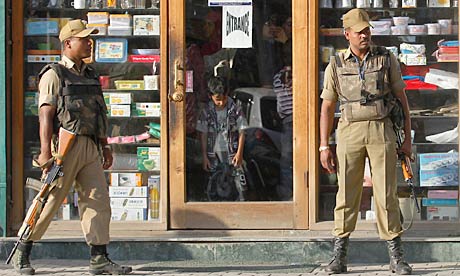
The troubled Indian state of Kashmir was braced for renewed violence as separatist leaders rejected a government bid to defuse mounting civil unrest.
Indian ministers had pledged to work to release hundreds of young protesters arrested in recent unrest and to review the massive deployment of security forces in the disputed Himalayan territory.
Syed Ali Shah Gilani, a hardline leader who has considerable authority over youths who have been rioting for several months in Kashmir, described the package of measures offered by New Delhi as "a time-gaining exercise, unrealistic and mere eyewash".
As local security authorities moved to lift curfews in sensitive parts of the Muslim-majority state that have paralysed everyday life for more than two weeks, Gilani called for local people to show their anger through a general strike over the next two days. Observers said that further clashes seemed inevitable.
"It's a trial of strength. Now that the government wants to normalise things, the separatists are looking to make sure the mobilisation continues," said one senior Kashmiri journalist. Separatist politicians and demonstrators reject Indian rule and want independence or a merger with predominantly Muslim Pakistan.
Mirwaiz Umar Farooq, another separatist leader, said India's initiative was inadequate because not all parties were being consulted.
The package of Indian measures was announced after a high-level delegation of parliamentarians headed by the powerful home minister Palaniappan Chidambaram visited Kashmir last week. There has been widespread concern within the Indian political and security establishment that the local state government is incapable of curbing growing violence. In addition to the release of hundreds of detainees held for rioting, the new proposed measures include a review of the deployment of security forces with the aim of reducing military presence in civilian areas and a dialogue with all local political leaders.
Military authorities would also be urged to consider if deeply unpopular laws granting security forces extensive powers of search and detention as well as legal immunity might be lifted in some areas, officials said.
The steps "should address the concerns of different sections of people, including protesters," Chidambaram told reporters.
The Indian government announced today it would be also asking Indian companies to fund two-year internships for 50,000 young people from Kashmir. At least 107 people, mostly teenage boys and young men in their 20s, have died in a crackdown by security forces on often-violent demonstrations since June. Most have been killed when poorly-trained and badly-equipped security forces have opened fire on unarmed protesters. Security forces say they are acting in self-defence. The violence has brought a nascent economic recovery in Kashmir – one if India's richest states – to a halt and caused huge problems to local communities.
Thousands of people crowded markets to stock up on food and other essentials when authorities relaxed the curfew for several hours in Srinagar, the main city in the region, and seven other towns.
Professor Sheikh Shauqat, who teaches law at Srinagar University, said local people were tired of the violence and economic disruption but still supported agitation. "They do not want to stop the demonstrations until they feel their sacrifice has not been in vain. So any lull in the violence will just be temporary," Shauqat told the Guardian.
"The separatist leaders see nothing in the package of measures that tackles any of the political issues." Kashmir has been divided between India and Pakistan – and claimed by both – since the two states gained independence from Britain in 1947. Three wars have been fought by the hostile neighbours over the former princely mountain state.
Since 1989, Kashmiri extremists and other Islamic militants have waged a violent insurgency against Indian security forces in which an estimated 70,000 people have died. In recent years, the situation has improved in part due to a decline in support for such militants from Pakistan. Until June, this year had seen one of the lowest totals of civilian casualties for decades. Analysts fear the casualties sustained by protesters will lead to the radicalisation of a new generation of militants. In addition to the dead, many thousands have been seriously injured or beaten. The Indian foreign minister, SM Krishna, and his Pakistani counterpart, Shah Mahmood Qureshi, are expected to meet tomorrow at the United Nations general assembly. Kashmir and terrorism will be among the topics discussed, Indian government sources said.












0 comments:
Post a Comment